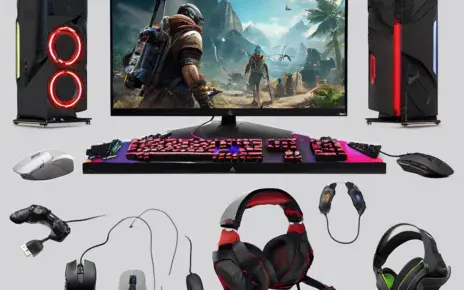The gaming world isn’t what it used to be. Remember when you’d head to a store, grab a shiny new game off the shelf, and hold that baby in your hands? That experience is changing fast, thanks to digital downloads. So here we are, trying to make sense of what’s better: digital or physical PC games.
Why bother comparing the two? Because how you game is about more than just pressing buttons. It’s about owning your experience, whether you’re a casual player or a hardcore collector. Understanding the perks and pitfalls of each format helps carve out a gaming path that’s all your own.
The Rise of Digital Gaming: Convenience and Access
The digital age has revolutionized gaming. With just a few clicks or taps, you can get the latest blockbuster or indie gem right there on your screen—no waiting in line or hunting for a copy. This convenience has been a massive game-changer.
Digital platforms like Steam, Epic Games Store, GOG, and Ubisoft Connect make it incredibly easy to access games with just an internet connection. Immediate downloads mean that midnight releases really happen at midnight. If patience isn’t your thing, digital’s got your back.
Another advantage is that digital games take up no physical space. No more clunky CDs or boxes cluttering up your room. Your entire library is stored in the cloud or on your hard drive, making organization a breeze. Plus, digital game purchases are often tied to an account, meaning you can re-download them anytime without worrying about losing a disc.
Thinking about the planet? Digital games eliminate plastic waste, reducing the need for packaging and shipping. This eco-friendly aspect appeals to gamers who care about sustainability. The reduced carbon footprint of digital distribution compared to manufacturing, packaging, and transporting physical copies is a significant environmental benefit.
Pros of Digital Games:
- Instant access and downloads
- No physical clutter
- Frequent discounts and sales
- Cloud storage for easy access
- Environmentally friendly
Cons of Digital Games:
- No resale or trade-in value
- Requires an internet connection for downloads
- Account security risks (hacking, bans, etc.)
- Potential loss of access if a platform shuts down
Physical Games: Tangibility and Collection Value
There’s nothing quite like holding a physical game in your hands. For many gamers, there’s an unmatched charm in seeing the artwork, flipping through a manual, and adding that colorful box to the shelf. These tangible experiences tap into the nostalgia of gaming history.
Physical games are all about ownership. When you buy a game, it’s yours in a way that sometimes feels different from digital downloads. You can share, loan, or resell physical copies, something that’s impossible with most digital games. This means you can recoup some of your money if you decide to part ways with a title. Many collectors value sealed or limited-edition copies that can appreciate in value over time.
For collectors, physical games often carry special value. Limited edition releases with extras like posters, maps, or figurines make them prized possessions. Over time, certain physical copies can even become rare collectibles, increasing in value. Additionally, physical games can sometimes be played without an internet connection, ensuring access even if digital authentication servers go down.
Pros of Physical Games:
- Full ownership with resale and trade-in options
- No reliance on online accounts or servers
- Collectible value for rare or special editions
- Playable without an internet connection
- Includes physical extras like manuals or artwork
Cons of Physical Games:
- Can take up significant storage space
- Risk of damage, loss, or wear and tear
- May require updates that still need an internet connection
- Less frequent discounts compared to digital versions
Cost Considerations: Budgeting for Digital vs. Physical Games
When it comes to cost, both digital and physical PC games have their advantages. Digital often wins in terms of initial savings, thanks to frequent sales, bundles, and discounts from online platforms. Seasonal sales like Steam’s Summer Sale, Epic’s Free Game Fridays, and GOG’s DRM-free deals provide incredible discounts for gamers looking to expand their library on a budget.
Physical games, however, offer long-term value through resale and trade-in options. Buying a physical game means you can sell it once you’re done, potentially funding your next purchase. There’s a tangible financial return that digital games simply don’t offer. Additionally, certain physical games, especially limited editions, can appreciate in value over time, making them a smart investment for collectors.
Subscription services like Xbox Game Pass, PlayStation Plus, and EA Play add another dimension to digital gaming. These services provide access to hundreds of games for a monthly fee, making it an attractive option for players who want variety without committing to individual purchases. However, the recurring fees can add up over time, and games may rotate in and out of the library, meaning you don’t own them permanently.
Storage and Space: Managing Your Game Library
Digital games eliminate physical clutter, but they introduce another storage challenge—hard drive space. With modern AAA titles taking up upwards of 100GB, even large storage drives can fill up quickly. Managing downloads and cloud storage effectively becomes a necessity. Some platforms allow archiving games to external drives, but this requires additional hardware investments.
Physical games come with their own storage issues. A massive collection takes up shelf space, and finding room for dozens (or hundreds) of game cases can be a struggle. However, with physical copies, you don’t have to worry about hard drive space since the game data is on the disc. Additionally, some physical editions allow installation without requiring internet access, a major plus for gamers in areas with limited connectivity.
Security, Reliability, and Longevity: Weighing the Risks
Security is a key concern with digital gaming. Hacked accounts, lost login details, or platform shutdowns can all lead to lost games. Protecting your digital library requires strong passwords, two-factor authentication, and regular account maintenance. Additionally, digital rights management (DRM) can restrict game access if servers go down or authentication fails.
Physical games avoid these issues but come with their own risks. Discs can get scratched, lost, or broken, making them unplayable. Proper storage and handling are essential to preserving a physical collection. Some older physical games require patches to work correctly, and if developers remove support or servers shut down, players may be left without crucial updates.
Conclusion: Which One Should You Choose?
Ultimately, the choice between digital and physical PC games depends on your gaming habits and preferences. If you prioritize convenience, instant access, and frequent discounts, digital gaming is the way to go. The ability to store a vast library without physical clutter makes it appealing to modern gamers, and the environmental benefits are an added plus.
However, if you value tangible ownership, resale potential, and collector’s items, physical gaming remains a strong contender. The ability to share and sell games provides financial flexibility, and owning a physical copy guarantees access even if digital services shut down. Some gamers also appreciate the nostalgia and aesthetic of a well-stocked shelf of games.
For many gamers, a mix of both formats offers the best of both worlds. Taking advantage of digital deals while keeping physical copies of your most treasured games creates a balanced and flexible gaming experience. Whatever your preference, understanding the benefits and drawbacks of each format helps you make informed decisions that enhance your gaming journey.




